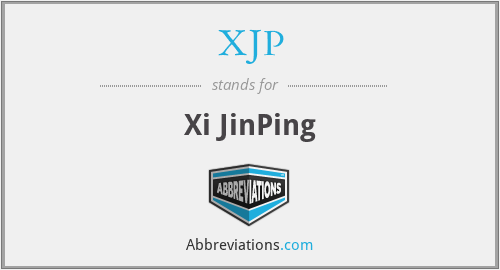What does XJP mean in Governmental?
This page is about the meanings of the acronym/abbreviation/shorthand XJP in the field in general and in the Governmental terminology in particular.
Xi JinPing
Translation
Find a translation for Xi JinPing in other languages:
Select another language:
- - Select -
- 简体中文 (Chinese - Simplified)
- 繁體中文 (Chinese - Traditional)
- Español (Spanish)
- Esperanto (Esperanto)
- 日本語 (Japanese)
- Português (Portuguese)
- Deutsch (German)
- العربية (Arabic)
- Français (French)
- Русский (Russian)
- ಕನ್ನಡ (Kannada)
- 한국어 (Korean)
- עברית (Hebrew)
- Gaeilge (Irish)
- Українська (Ukrainian)
- اردو (Urdu)
- Magyar (Hungarian)
- मानक हिन्दी (Hindi)
- Indonesia (Indonesian)
- Italiano (Italian)
- தமிழ் (Tamil)
- Türkçe (Turkish)
- తెలుగు (Telugu)
- ภาษาไทย (Thai)
- Tiếng Việt (Vietnamese)
- Čeština (Czech)
- Polski (Polish)
- Bahasa Indonesia (Indonesian)
- Românește (Romanian)
- Nederlands (Dutch)
- Ελληνικά (Greek)
- Latinum (Latin)
- Svenska (Swedish)
- Dansk (Danish)
- Suomi (Finnish)
- فارسی (Persian)
- ייִדיש (Yiddish)
- հայերեն (Armenian)
- Norsk (Norwegian)
- English (English)
Definition
What does XJP mean?
- Xi Jinping
- Xi Jinping (; Chinese: 习近平; Mandarin pronunciation: [ɕǐ tɕîn.pʰǐŋ]; born 15 June 1953) is a Chinese politician serving as general secretary of the Communist Party of China (CPC), President of the People's Republic of China (PRC), and chairman of the Central Military Commission (CMC). Often described as China's "paramount leader" since 2012, he officially received the title of "core leader" from the CPC in 2016. As general secretary, Xi holds an ex-officio seat on the Politburo Standing Committee of the Communist Party of China, China's top decision-making body.Xi is the first general secretary born after the Second World War and the establishment of the People's Republic of China. The son of Chinese Communist veteran Xi Zhongxun, he was exiled to rural Yanchuan County as a teenager following his father's purge during the Cultural Revolution, and lived in a cave in the village of Liangjiahe, where he organised communal labourers. After studying at the Tsinghua University as a "Worker-Peasant-Soldier student", Xi rose through the ranks politically in China's coastal provinces. Xi was governor of Fujian from 1999 to 2002, and governor, then party secretary of neighbouring Zhejiang from 2002 to 2007. Following the dismissal of Chen Liangyu, Xi was transferred to Shanghai as party secretary for a brief period in 2007. He joined the Politburo Standing Committee and central secretariat in October 2007, spending the next five years as Hu Jintao's presumed successor. Xi was vice president from 2008 to 2013 and vice chairman of the Central Military Commission from 2010 to 2012. Since assuming power, Xi has introduced far-ranging measures to enforce party discipline and to ensure internal unity. His signature anti-corruption campaign has led to the downfall of prominent incumbent and retired Communist Party officials, including members of the Politburo Standing Committee. Described as a Chinese nationalist, he has tightened restrictions over civil society and ideological discourse, advocating Internet censorship in China as the concept of "internet sovereignty". Xi has called for further socialist market economic reforms, for governing according to the law and for strengthening legal institutions, with an emphasis on individual and national aspirations under the slogan "Chinese Dream". He has also championed a more assertive foreign policy, particularly with regard to China–Japan relations, China's claims in the South China Sea, and its role as a leading advocate of free trade and globalization. Xi has sought to expand China's African and Eurasian influence through the One Belt One Road Initiative. The 2015 meeting between Xi and Taiwanese President Ma Ying-jeou marked the first time the political leaders of both sides of the Taiwan Strait have met since the end of the Chinese Civil War in 1950.Considered the central figure of the fifth generation of leadership of the People's Republic, Xi has significantly centralised institutional power by taking on a wide range of leadership positions, including chairing the newly formed National Security Commission, as well as new steering committees on economic and social reforms, military restructuring and modernization, and the Internet. Said to be one of the most powerful leaders in modern Chinese history, Xi's political thoughts have been written into the party and state constitutions, and under his leadership the latter was amended to abolish term limits for the presidency. In 2018, Forbes ranked him as the most powerful and influential person in the world, dethroning Russian President Vladimir Putin who held the accolade for five consecutive years.
Embed
Citation
Use the citation below to add this abbreviation to your bibliography:
Style:MLAChicagoAPA
"XJP." Abbreviations.com. STANDS4 LLC, 2024. Web. 29 Apr. 2024. <https://www.abbreviations.com/term/2655476>.



Discuss this XJP abbreviation with the community:
Report Comment
We're doing our best to make sure our content is useful, accurate and safe.
If by any chance you spot an inappropriate comment while navigating through our website please use this form to let us know, and we'll take care of it shortly.
Attachment
You need to be logged in to favorite.
Log In